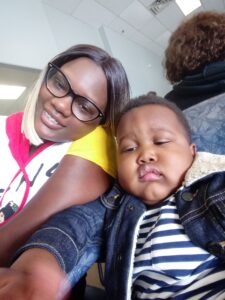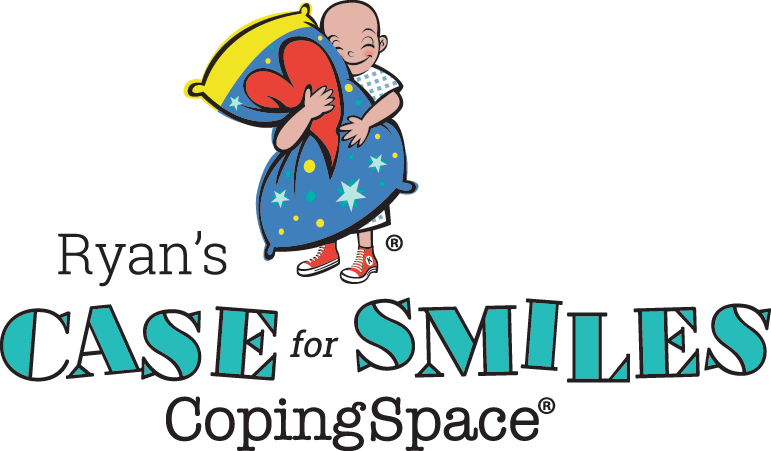BLOG
How To Talk About Costs With Your Child’s Cancer Care Team
By Devin Traxler, MSW, LSW
Cancer, other illnesses, and injuries affect the whole family, especially when a child is diagnosed. There is fear and anxiety around their health and treatment outcome, stress from managing endless appointments, grief over the loss of “normal life”, and shifts in family dynamics.
One aspect that doesn’t get discussed nearly enough is the costs of cancer and other medical treatments.
If you’re worried about affording your child’s care or paying for everyday expenses on top of medical costs, you’re not alone and there are lots of resources out there to help.
Medical Costs and Financial Trauma
 Financially, nearly one in three families are unable to meet their own basic needs when a child is in cancer treatment.1 And the stress of these costs can take an emotional toll, especially on fathers. In fact, 57% of dads scored in the moderate-to-severe range for post-traumatic stress symptoms one year after their child’s diagnosis.2
Financially, nearly one in three families are unable to meet their own basic needs when a child is in cancer treatment.1 And the stress of these costs can take an emotional toll, especially on fathers. In fact, 57% of dads scored in the moderate-to-severe range for post-traumatic stress symptoms one year after their child’s diagnosis.2
Though financial trauma can affect any parent or caregiver, one study found, that fathers specifically experience feelings of embarrassment, fear and anxiety when they can’t provide for their child going through treatment while meeting their family’s basic needs. They may also feel uncomfortable talking about finances and be hesitant to express their needs.
Asking for Help Managing Your Child’s Medical Expenses
We know that asking for help, especially related to money, can be daunting, uncomfortable, and even a topic that many families or communities traditionally avoid. However, there is no shame in being worried about money while your child is going through cancer or other treatments. There are lots of resources out there to help.
Marsha, mom to Saqora, encourages other caregivers to “get help where you can so you can be with your child in their biggest time of need.”
Here are some tips you can follow to make important conversations about the cost of your child’s care a little easier.
Talking About the Many Costs of Cancer and Other Medical Treatments
When treatment for cancer and other illnesses and injuries begins, you get a lot of information all at once. There are several names to remember, people to meet, places to go, and big questions about what treatment is going to be like from a medical and emotional perspective.
We know that your main priority is figuring out what your child needs to get better. Conversations about finances or the cost of treatment may get overlooked, pushed back, or forgotten among the long list of other questions swimming through your head.
Still, there may be some unexpected new expenses that come with treatment, such as hospital food, extra gas or public transit tickets for getting to and from the care center, childcare for your other children, and so on.
 Raven, mom of cancer hero Noel, explains how hard it can be to balance health and finances.
Raven, mom of cancer hero Noel, explains how hard it can be to balance health and finances.
“It was a very scary place to be,” Raven shared. “I had to choose my son’s health or money for bills to stay in our home. It’s not a fair decision to have to make. Do I leave my 4-year-old son at the hospital with the nurses and go to work? Or be there to accompany and comfort my sick child? A mom is always going to choose their child.”
Like Raven, you’re not alone and you didn’t do anything wrong, though it can help to start asking questions about cost and financial resources as early as you can.
How to Approach Medical Cost Conversations
There is no one-size-fits-all strategy that works for every person dealing with childhood illnesses and injuries, but you may find things that help other caregivers may also work for you.
For example, some families receive a binder from their child’s care team with all of the information about their doctors and medical team, treatment plan, and more. Others might purchase a folder and download the Caregiver Worksheet to keep track of the care team. You can also use these resources to keep important financial documents and bills in one place. This can be a useful way to keep track of payments and have them on hand when talking about certain bills or money concerns with someone at your care center.
You can also keep a running list of questions for your care providers in your binder or another place that works best for you. That way, you can jot things down in between or during hospital visits so you won’t forget to ask during your next appointment.
Who to Talk to About Your Child’s Medical Expenses
The hospital or clinic may assign you a patient navigator or social worker who can either answer your questions or direct you to someone who can. If they haven’t already, you can ask your care team to set you up with this resource.
Your hospital’s billing department is also a good place to go when you have questions about the cost of treatment.
While anyone on your care team can help you with these questions, you may want to choose a person who you feel comfortable confiding in. Conversations about money and finances can be uncomfortable, but candid conversations are important for the well-being of the entire family. Even if this person is not a financial expert, they can help track down the answers you need and navigate through the healthcare system.
If your child has cancer, you can also talk directly to a financial expert through Family Reach’s free financial coaching service. A volunteer Certified Financial Planner™ professional will share their expert advice, help you manage your finances, and advocate for your needs.
Questions to Ask Your Care Team About Medical Costs
If you’re ready to talk to your care team about the various costs of cancer, here are some questions that may help guide your conversations.
- How much is my child’s treatment going to cost?
- How many days a week will I need to bring them to treatment?
- Are their siblings allowed to come to the treatment center with us?
- Can someone review my insurance with me to see what will be covered?
- Is there someone I can talk to about a payment plan for costs not covered by insurance — like a patient navigator or social worker?
- Does the hospital have any financial assistance programs for my child’s treatment?
- Does the hospital provide any meals for parents?
- Is my family eligible for any government assistance programs?
- Are there more affordable alternatives to the pills you prescribed?
- Where is the most affordable parking here? Do you offer parking vouchers?
- Is it possible to schedule those follow-up appointments on the same day so I only have to take one day off of work?
- Can you help me apply for financial support from Family Reach?
- Do you know of any organizations that offer financial help to cancer patients?
Some of these questions may not fit your situation, but the important thing is to have a conversation. Your care team, your friends, Family Reach, and others are in your corner — and there’s no shame in asking them for help.
Find out more about how Family Reach can help you manage the financial side effects of your child’s cancer diagnosis.
**Statements on this blog reflect the author’s personal opinion and do not represent the views of Ryan’s Case for Smiles. They are also not to be viewed as personal medical advice, but rather for the purpose of general knowledge. The reader should speak to their healthcare team, or their child’s, for medical advice.**
 About the Author: Devin Traxler, MSW, LSW, is a Lead Navigator at Family Reach. She loves being able to tie the heart work with the hard work, working to improve systems and optimize technology to ensure Family Reach can effectively deliver the Financial Treatment Program to more families every day.
About the Author: Devin Traxler, MSW, LSW, is a Lead Navigator at Family Reach. She loves being able to tie the heart work with the hard work, working to improve systems and optimize technology to ensure Family Reach can effectively deliver the Financial Treatment Program to more families every day.
References:
- Bona K, London WB, Guo D, Frank DA, Wolfe J. Trajectory of Material Hardship and Income Poverty in Families of Children Undergoing Chemotherapy: A Prospective Cohort Study. Pediatr Blood Cancer. 2016;63(1):105-111. doi:10.1002/pbc.2576
- Kazak A, Boeving CA, Alderfer M, Wei-Ting H, Reilly A. Posttraumatic Stress Symptoms During Treatment in Parents of Children with Cancer. J Clinical Onc. 2005 Oct 20;23(30):7405-10. doi: 10.1200/JCO.2005.09.110. Epub 2005 Sep 12.
- Santacroce SJ, Killela MK, Kerr G, Leckey JA, Kneipp SM. Fathers’ psychological responses to pediatric cancer-induced financial distress. Pediatr Blood Cancer. 2020 Jun;67(6):e28281. doi: 10.1002/pbc.28281. Epub 2020 Apr 11.
